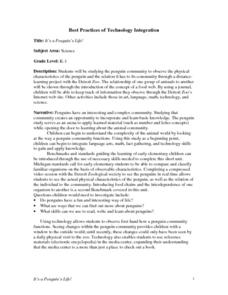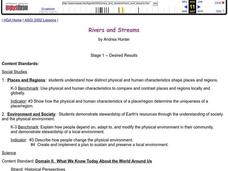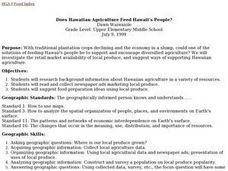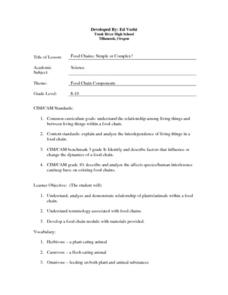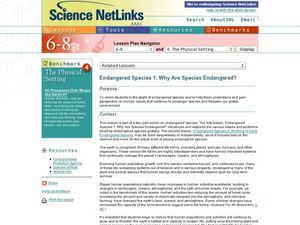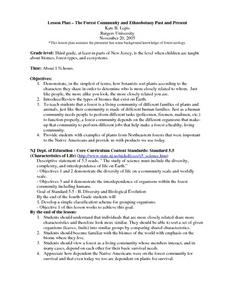Curated OER
It's a Penguin's Life!
Students will be studying the penguin community to observe the physical characteristics of the penguin and the relation it has to its community through a distance learning project with the Detroit Zoo.
Curated OER
Rivers and Streams
Young scholars research the rivers, streams and water bodies of Hawaii. They read a variety of books, play Bingo with water-related terms, create and maintain water-themed journals, view videos, conduct Internet research and participate...
Curated OER
The Wonderful World of Slugs
Examine a slug? Of course, what else would a 2nd grader do with it? Pupils use clues and go on a slug hunt, read a slug story, or make a cooperative group mural of a slug's habitat. While older learners catalog slugs, go on a slug hunt,...
Curated OER
Does Hawaiian Agriculture Feed Hawaii's People?
Students research background information about Hawaiian agriculture in a variety of resources, then read and collect newspaper ads marketing local produce. They suggest food preparation ideas using local produce.
Curated OER
Bird Banners
Students create banners for their classroom that contain the same information as field guides.
BBC
Sorting and Using Materials
First and second graders see that everyday objects are made from a variety of materials. They interact with objects such as keys, plastic spoons, a wooden ruler, a towel, and a plastic bag. A discussion ensues which leads them to...
Curated OER
Food Chains: Simple or Complex?
Students explore the relationships within the food chain between plants and animals. They construct modules of food chains, keeping them simple and not complex. They focus on what the animals eat and not on what eats it.
Curated OER
What in Our World Affects the Way People Live
Sixth graders study various maps that show geographical features and population. They compare the maps and make inferences about how various geographical features influence the population and human activities of an area.
Curated OER
Living On Earth
Students discover the many different animals within various habitats and discover how each individual species interacts with its particular environment. Through charting different animals and their distinct habitat and matching animals...
Curated OER
Endangered Species 1: Why are Species Endangered?
Emerging ecologists examine endangered species by visiting the US Environmental Protection Agency website. They consider human contribution to the decline of different species. They research an endangered animal and then craft a poster...
Alabama Learning Exchange
Nature's Life Cycle
Become a member of the Pollution Patrol and stand up to litter! After discussing the life cycle of seeds and discussing how plants figure into the food chain, young conservationists engage in several activities involving podcasts,...
Curated OER
Native Species Restoration and its Impact on Local Populations
Young scholars explore how predators help control the growth of prey species for a more balanced ecosystem.
Curated OER
Ecosystems Connect
Students investigate ecosystems near their school and across the world. They examine both living (biotic) and non-living (abiotic) elements of each. They recognize ecosystems from various continents around the globe. The use of computers...
Curated OER
Bird Brained?
Learners identify general abilities that indicate animal cognitive intelligence. In this biology instructional activity, students create an intelligence testing challenge for ravens. They compare its ability to that of a crow.
Curated OER
The Forest Community And Ethnobotany Past And Present
Students describe a forest as a living community. They determine members interact, and in many cases, depend on each other for their basic survival needs. They investigate how dependent the Native Americans were on the forest...
Curated OER
Sibling Relationships in the Animal World
Students research sibling relationships in the animal world. In this animal science lesson, students read the book, Sisters and Brothers: Sibling Relationships in the Animal World and discuss the sibling relationships. Students choose an...
Curated OER
Animated Video Productions - Life Cycles
Seventh graders compare/contrast the life cycles of free-living organisms to that of parasites. They conduct Internet research, illustrate the stages of a specific organisms's life cycle, and direct and produce a mini-video production.
Curated OER
The Race
Students play game simulating route turtle hatchlings take from clutch to ocean, and describe threats hatchlings face and how this affects the marine turtle population.
Michigan Sea Grant
Food Chains and Webs
Starting with a simple food chain, young scientists interpret the difference and interrelatedness between herbivores, carnivores and producers. They answer questions related to cause and effect of food chain disruptions, including the...
Curated OER
What is Cacao?
Students use the Internet to learn about the cacao plant. In this plants lesson plan, students complete a KWL chart on chocolate, learn about cocoa plants and discuss the parts of a plant. Students use the Internet to learn...
Curated OER
Non Native Species: English Ivy-Landscape Plant or Deadly Killer?
High schoolers study the impact that invasive species have on biodiversity and more natural areas.
Curated OER
Managing Wildlife
Learners explore the relationship between wildlife and humans in northern New England. They also brainstorm ideas on why they think some species are greater in population than others in a given area.
Curated OER
Science Lesson: Chocolate Flavored Cherries
Students are able to identify start and stop sequences in DNA. They are able to model using restriction enzyme and ligase to remove sections of DNA and reattach them. Students are introduced to the process of recombinat DNA through the...


